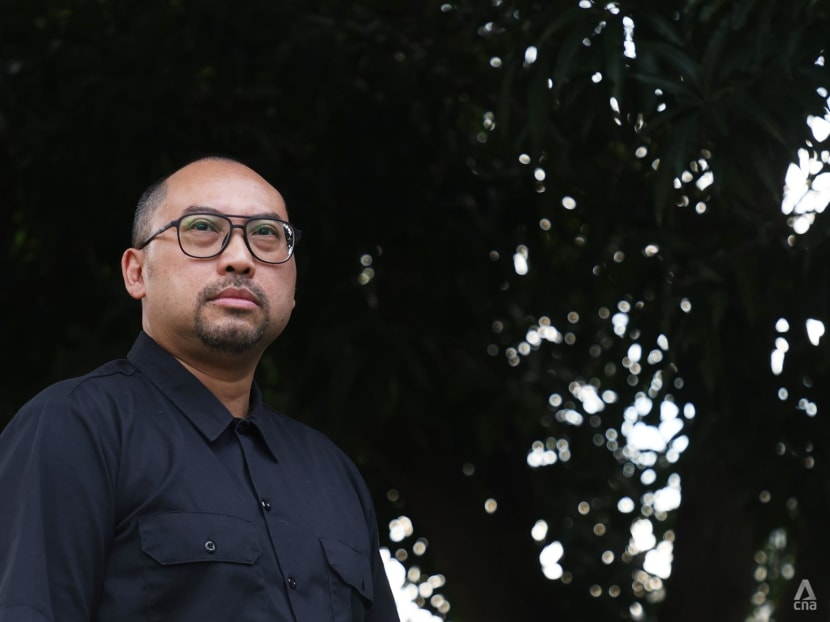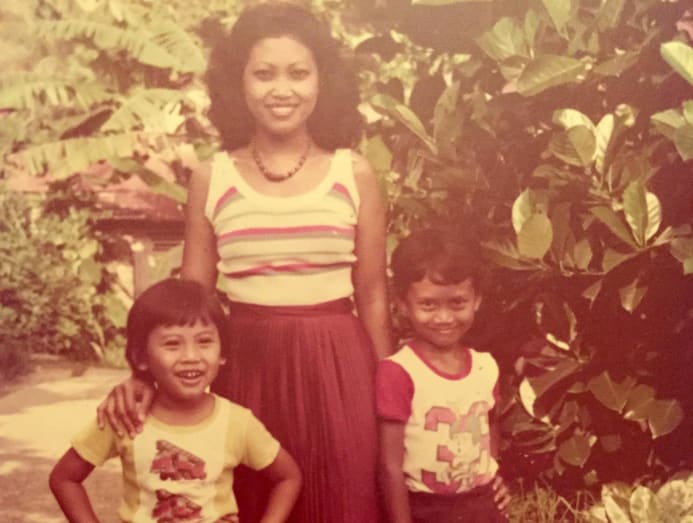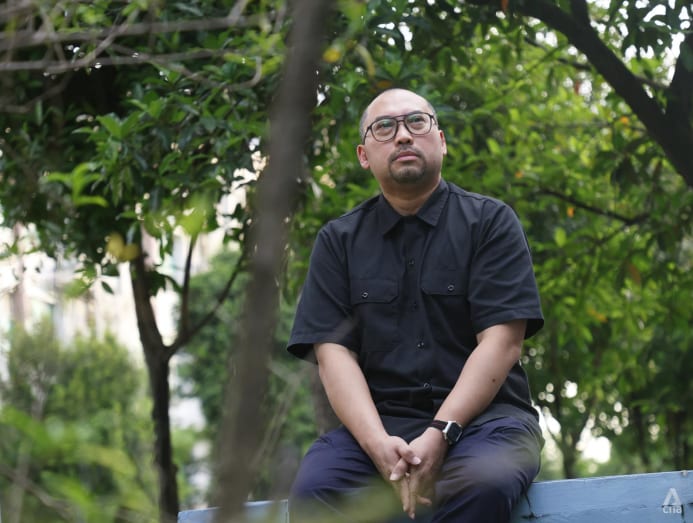My mother no longer remembers me and it hurts more than I can say
Mr Imran Johri reflects on the strange but acute pain of losing his mother to her years-long battle with dementia, even though she is still alive.

Mr Imran Johri pictured on May 17, 2025. (Photo: CNA/Ooi Boon Keong)

This audio is generated by an AI tool.
Early in my career, I became a comedy writer. This wasn’t surprising since I’d been raised in an environment of inappropriate wit, toilet humour and general linguistic tomfoolery after all. An environment that can be attributed to one person: my mother.
Before her forced retirement, Cikgu Alus was a very chill primary school teacher. She was particularly fond of wordplay and nonsensical rhyming, and was especially known for her hilarious roll call in the classroom.
Riotous laughter would erupt at the start of each day as she called out her students’ names, each one adapted for laughs. Abu Bakar was dubbed "Abu Terbakar" ("Abu’s on fire"), to the raucous delight of the kids. And she would keep going down the list.
She was far from politically correct. Everywhere she went, she was the life of the party.
Even her parenting was rooted in slapstick comedy.
Growing up, no matter how sad I was, she could always lift me out of my funk with her go-to trick. She would administer slow, deliberate, upward strokes to my inordinately large forehead that would then abruptly end with a full-palmed slap so sudden, I would forget why I was down and instantly burst out laughing.

THE PARTY GOES QUIET
She kept up her spirited, cartoonish ways until I was in university.
I distinctly remember the day I got the call informing me that her incessant migraines – ones that had plagued her for years – had finally been diagnosed as a benign tumour growing in her brain.
In 1997, following a complicated but successful operation to remove the tumour, she started down the path of healing – one that eventually became her descent into a void, one from which she could not be pulled out by any of us.
The first five years of recovery were hard, but hopeful. Day by day, she started becoming more like herself again. Eventually, we figured we might even get her back to her joking self in time.
However, things took a rough turn about 10 years ago, when my mum was in her 60s.
What started as bouts of forgetfulness turned into bouts of blankness. By the time we got her diagnosed with dementia, she was already in an advanced stage.
Even then, none of us knew what lay ahead: a traumatising sequence of watching a beloved parent fade away while still being physically present.
IS SHE STILL THERE?
Of all the known cruel ailments that affect us, dementia is among the cruellest.
This isn’t because it’s “more painful” or “more severe” than other illnesses. The cruel nature of dementia is in its ability to cause pain and suffering not just for patients, but everyone around them as well.
For my mother, the first to be forgotten were the spouses of her children, then her grandchildren.
After some years, she reached a point where she may recall somewhat only one or two family members.
As painful as this has been for myself and my siblings, the hardest hit in all of this has been my father. As her main caregiver for the past 28 years, he has had to spend every single day witnessing the love of his life slowly fade away through a relentless series of hospital visits, medications and treatments.
Up to a few months ago, the one person she would always look to and smile at was my father. And me, to an extent, probably because I resemble him.
Then tragedy struck.
My mum, who can barely take a few steps without falling, had numerous falls. This was despite us taking every precaution to ensure her safety. Her bed is barricaded, she is wheelchaired everywhere and she is never left unaccompanied or unsupervised.
Even as dementia robs my mother of her memory and motor functions, it cannot take away her stubbornness. She will always try to get up on her own. There is simply no reasoning with her. Even if left alone for a minute, she will almost certainly try to walk.
A couple of months ago, she did it again. This time, she fell on her face with such force that she sustained a fractured orbital bone, internal bleeding in her skull and even managed to tear a ligament in her knee.
Multiple hospital visits later, I think this last incident has really taken its toll.
SHE DOES NOT KNOW ME ANYMORE
I’ve always been able to get her to laugh. Even in the later stages of her dementia, I could still elicit a smile – from a simple inappropriate rhyme to a quick tickle when I kissed her. There was always a spark in her eyes when I did this – a light of recognition, a connection that her son was there.
However, with her last fall, I think I’ve lost her.
My father, fatigued from years of caregiving, seems to be back on track now – carrying on with care since the last incident. His advantage lies in the fact that he is with her all day, every day.
Not being able to share this advantage, I find myself losing ground faster than I can come to grips with it. This is something that cuts deep into my very being.

On my last visit, I walked in and greeted my mother as usual – with a big smile and hug. She looked at me and my heart started sinking when I realised that she was trying to place who I was.
I immediately tried the usual humour to connect with her – the humour that she’d passed on to me, taught me since childhood – but she didn’t react.
She smiled politely, the way one does when meeting strangers for the first time. That spark, that light of recognition, had finally fizzled out.
At this very moment, I am unable to grieve, because my mother is still here. But the spirited, hilarious, politically incorrect woman – the one who raised me, fed me, loved me into becoming the person I am today – she’s already gone.
The woman who would comfort me with soothing strokes of her hand and cheer me up with cheeky slaps to the forehead will never return to me again.
How can I mourn her loss while she still lives and breathes?
It’s a strange but acute sort of pain, not just for myself but my siblings. All we can do is focus on maintaining caregiving support to our father, as we do our best to keep this new version of my mother – now an elderly stranger – comfortable in her twilight years.
Imran Johri is a marketing and editorial professional and a father of three.
If you have an experience to share or know someone who wishes to contribute to this series, write to voices [at] mediacorp.com.sg with your full name, address and phone number.














